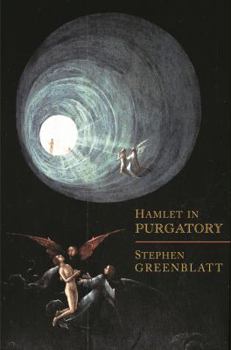Hamlet in Purgatory
Select Format
Select Condition 
Book Overview
In Hamlet in Purgatory, renowned literary scholar Stephen Greenblatt delves into his longtime fascination with the ghost of Hamlet's father, and his daring and ultimately gratifying journey takes him... This description may be from another edition of this product.
Format:Hardcover
Language:English
ISBN:0691058733
ISBN13:9780691058733
Release Date:April 2001
Publisher:Princeton University Press
Length:320 Pages
Weight:1.35 lbs.
Dimensions:1.1" x 6.0" x 9.3"
Customer Reviews
5 ratings
Who's there?
Published by Thriftbooks.com User , 17 years ago
An exhaustive investigation about the role of spirits from the other world mirrors the otherness regarded as the unknown wasteland of the human soul. I guess this passionate, interesting and eloquent study will absorb all your interest, taking into account we are talking the greatest Western playwright ever born, since the Greek tragic playwrights.
It depends on what you're looking for
Published by Thriftbooks.com User , 21 years ago
As an unique insight into Elizabethan culture, it's fascinating. As an analysis of Hamlet, it's lacking. Many of his points are unsupported by textual evidence and much of his excellent historical information unconnected to the play itself. Nonetheless, I would recommend this book to anyone with a love of Shakespeare that goes beyond the word and into the period as it is a great read.
Superb Writing and Scholarship
Published by Thriftbooks.com User , 22 years ago
This is an excellent book--excellent scholarship. I highly recommend it to anyone generally interested in medieval and Elizabethan accounts on purgatory, or to those who have an interest in Shakepeare studies. Even for those who don't, this is an excellent book, and my interest in it grew with every turn of the page. It is rich and well-written.Chapter Two: "Imagining Purgatory" discusses various philosophical and medieval connections (via manuscripts) to Shakespeare's texts (also see the classic, "The Medieval Heritage of Elizabethan Tragedy"). Chapter Three: "The Flights of Memory" (oddly enough, also see Derrida's The Gift of Death/U Chicago Press, Staten's Eros in Mourning, Derrida's The Work of Mourning, and E. Scarry's Body in Pain) is highly interesting material on the poetics of pain and suffering. Chapter Five: "Remember Me" is brilliant (also see Derrida/Levinas on the 'adieu' issue--U of Chicago and Stanford UP titles).Also see: Fish, How Milton Works (Harvard UP); Williams, Truth and Truthfulness (Princeton UP); Staten, Eros in Mourning (Johns Hopkins). I also recommend Robert Bell's dissertation on the harrowing of hell (English/U of Maryland/CSULB Emeritus).
Fun...
Published by Thriftbooks.com User , 22 years ago
Yeah, the reviewer from Santa Monica is on the mark. Good book, plenty of interesting historical tidbits, some connections to mull over, but Greenblatt doesn't really use his historical conclusions to much purpose in his analysis of Hamlet. Some of his literary points are strained ("the undiscovered country from whose bourne no traveller returns" means Hamlet has forgotten about the ghost; when Ophelia says that Hamlet looked as though he "had been loosed out of Hell" she of course means Purgatory instead of Hell, the rabble who follow Laetres against Claudius represent Protestants attacking the Catholic Church, etc.) but a couple are interesting, such as the play's disconnect between body and spirit mapped onto Elizabethan views of the Eucharist. But there are a good 150 pages (more than half the book) before we enter this dicey realm. Chapters 1-3 get five stars, and chapters 4-5 get three point five.
Magnificent Look at Shakespeare & the Concept of Purgatory
Published by Thriftbooks.com User , 23 years ago
I happened to be browsing through books the other day (as I am often wont to do) when the cover of this book caught my eye. It is detail from a painting by Hieronymus Bosch who happens to be one of my favorite painters. Then, when I saw the book was about Shakespeare, Hamlet and the concept of Purgatory, I was sold.Of course, need I mention the cliche about judging books by their covers and so on? There was no guarantee that I was going to like this book despite my attraction to its superficial accouterments. Still, sometimes you get lucky. This is a wonderful book.As a Catholic, the concept of Purgatory is an integral part of what I was taught about the afterlife. It was very interesting to see how the Christian view of the nature of Purgatory changed through time and how that view influenced (or, what is more likely, was influenced by) the literature of the Middle Ages. Greenblatt examines a number of ballads and other pieces from as early as the 11th & 12th centuries to show the change of Purgatory from a relatively restful place of waiting into a vicious hell with a time limit.By Shakespeare's time, of course, the Protestant Reformation had taken issue with the many abuses of the Church with respect to Purgatory (particularly indulgences) and all but eliminated Purgatory as part of the revised dogma. Still, as Greenblatt points out, the concept and the human feelings it addresses with respect to the afterlife cannot be eliminated by religious pronouncement. It finds its way into many of Shakespeare's plays in various guises. The spirits and ghosts that populate many of the plays are an instance as is the mention of chantries and "poor in yearly pay" of Henry V to name but a few. The clearest and highest development, however, is the appearance of the ghost in Hamlet.Greenblatt develops his ideas about the ghost in Hamlet in the last chapter of the book but this is just the peak of a wonderfully perceptive analysis of this aspect of influences on English literature. Anyone with any interest in the development of religion, the development of early English literature and/or Shakespeare should definitely take a look at this book.






